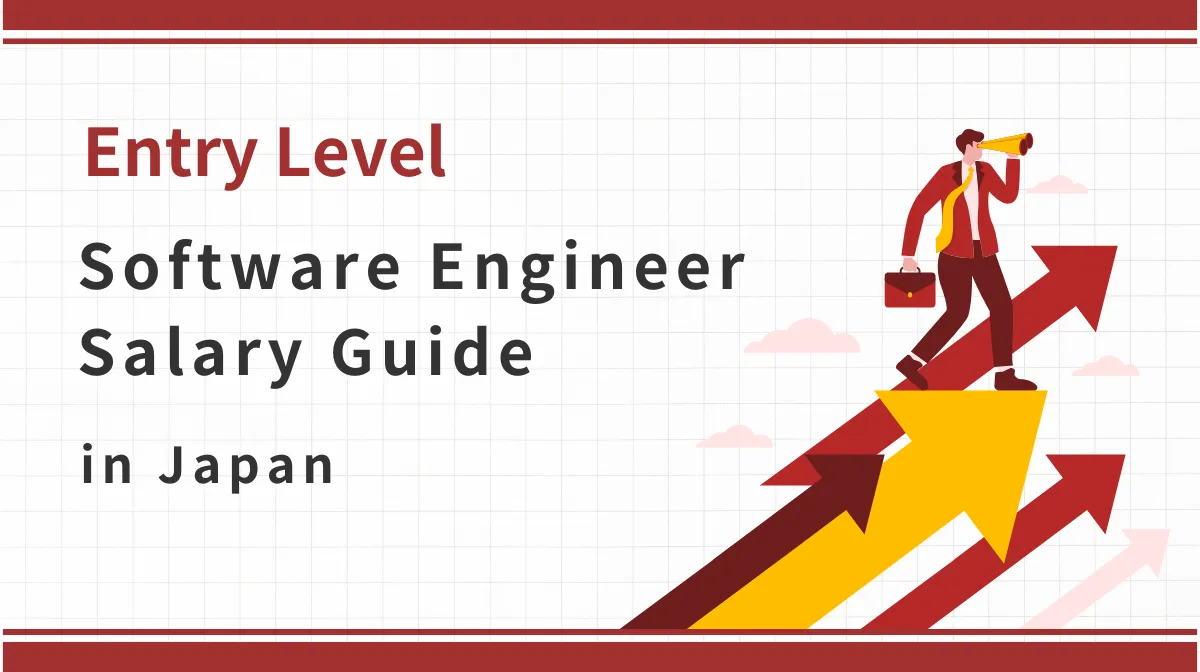Software engineering is a career path that offers significant income growth potential as you gain experience. However, salary levels can vary depending on company size, location, and skill set.
This article provides a comprehensive analysis of entry-level salary ranges, specific strategies for increasing your income, and future earnings prospects.
- Market rates for entry-level engineers
- Ways to increase your income quickly
- Real career paths and growth timelines
1.Average Salary for Entry-Level Software Engineers in Japan

With increasing demand in the IT industry, entry-level software engineer salaries show an upward trend. Let’s examine the salary structure in detail, which can vary significantly based on experience, skill level, and company size.
Starting Salary for Those Without Prior Experience
When starting a career as a software engineer without prior experience, salary levels vary significantly depending on company size. While this can differ by company, here’s a general reference:
Large IT Companies: Around 3-3.5 million yen annually, typically offering comprehensive training programs and extensive benefits.
Mid-sized IT Companies: Around 2.5-3 million yen annually, with base salary being modest but often supplemented by separate overtime pay.
Startups: Around 2.2-2.8 million yen annually, often with higher performance-based compensation, results-linked bonuses, and potential stock options.
For those without experience, a training period is common, during which only base salary is typically provided. However, those who have completed programming bootcamps or hold relevant certifications may receive higher starting salaries.
Salary Range for 1-3 Years of Experience
As you begin to gain practical experience, salaries can fluctuate significantly. Here’s a typical progression:
Year 1: Around 2.8-3.5 million yen, focusing on acquiring basic development skills and beginning to participate in team development.
Year 2: Increasing to around 3-4 million yen, with ability to handle development tasks independently and starting to lead small projects.
Year 3: Rising to around 3.5-4.5 million yen, establishing specialized expertise and taking on assistant team leader roles.
Salary increases during years 1-3 are primarily determined by project scale and responsibilities, market value of acquired technical skills, and the company’s evaluation and promotion systems. The type and depth of acquired technical skills tend to have a particularly significant impact on salary.
Salary Comparison by Company Size
Large companies with over 1,000 employees often set initial salaries in the upper 3 million yen range. Regular raises based on years of service and skill level, bonuses equivalent to 3-5 months of base salary, and comprehensive benefits are common.
Mid-sized companies and startups typically start around 3 million yen, with raises based on skills and technical ability, and bonuses equivalent to 2-4 months of base salary.
Key Points
Large Companies: Generally offer comprehensive training programs and clear career paths from entry-level positions, with steady income growth potential.
Small and Medium-sized Companies/Startups: Often provide early practical experience and responsible positions, with potential for rapid salary increases based on skill development.
2.Factors Affecting Salary

Entry-level software engineer salaries vary based on multiple factors. Understanding these factors is crucial when planning your career.
Impact of Skills and Certifications
Technical skills and certifications directly influence salary levels.
Technical Skills Examples
- Programming languages: Java, Python, JavaScript
- Framework expertise: Spring Framework, React/Vue.js
- Cloud technology proficiency: AWS, Azure
Certifications
- Fundamental Information Technology Engineer
- Applied Information Technology Engineer
- AWS Certified Solutions Architect
Having multiple technical skills or certifications can create synergistic effects beyond simple addition.
Geographic Salary Differences
Location significantly impacts salary levels. Base salaries in urban areas like Tokyo, Osaka, and Nagoya are typically 20-30% higher than in regional areas. Regional core cities offer about 80-90% of urban area base salaries.
Other regional areas typically offer 70-85% of urban area base salaries, though this may be offset by other benefits.
The recent rise in remote work has increased opportunities for regional workers to earn urban-level salaries, gradually reducing geographic salary disparities.
Reference: Ministry of Health, Labour and Welfare – Job Information Site jobtag
Industry-Specific Differences
Engineer salaries vary significantly by industry sector:
IT Companies
- Emphasis on skill evaluation
- Often include technical allowances
Financial/Insurance Industry
- Higher starting salaries
- Substantial performance bonuses
Manufacturing
- Stable salary increase systems
Web Companies
- Often use performance-based compensation systems
A notable point is that financial system development and web development require different skill sets and responsibility levels, even within engineering.
Salary structures also vary significantly. Acquiring industry-specific expertise and domain knowledge can lead to further salary increases.
■日本でエンジニアとしてキャリアアップしたい方へ
海外エンジニア転職支援サービス『 Bloomtech Career 』にご相談ください。「英語OK」「ビザサポートあり」「高年収企業」など、外国人エンジニア向けの求人を多数掲載。専任のキャリアアドバイザーが、あなたのスキル・希望に合った最適な日本企業をご紹介します。
▼簡単・無料!30秒で登録完了!まずはお気軽にご連絡ください!
Bloomtech Careerに無料相談してみる
3.Strategies for Income Growth Starting from Entry Level

When starting a career as a software engineer without experience, planned skill development and strategic career development are crucial. Here’s a detailed explanation of specific methods for increasing your income.
Effective Skill Development Methods
To achieve income growth, it’s important to efficiently acquire high-market-value skills.
Essential basic programming skills include HTML/CSS/JavaScript, Java or Python, and SQL fundamentals.
Additionally, understanding development tools like Git/GitHub, development environment setup, and testing methodologies is important.
Business skills such as communication ability, documentation, and presentation skills are also crucial evaluation factors.
Specific Methods for Skill Development
Utilizing online learning platforms: Udemy, Progate, Dotinstall are effective
Practical skill enhancement: Participating in internal training programs, hackathons, personal development projects
While pursuing the above learning, aiming for certifications like the Fundamental Information Technology Engineer Examination or AWS certifications can help systematically organize knowledge.
Timing Career Changes for Income Growth
While changing jobs is an effective means of increasing income, timing should be carefully considered. The first year is positioned as a period for acquiring basic skills, and job changes during this time are not recommended.
By the second year, as skill acquisition progresses and small project experience accumulates, it becomes a good time to assess market value. After the third year, with established expertise and project completion achievements, you’re in an advantageous position for salary negotiations.
To succeed in changing jobs, accumulating concrete achievements and acquiring high-market-value skills is important. Preparing a portfolio and understanding industry trends are also crucial elements for favorable negotiations.
Points for Salary Negotiations
Salary negotiation is a crucial opportunity for income growth. For effective negotiation, first accurately assess your market value. Research salary levels at similar companies and inventory your skill set, preparing to present specific achievements with numerical data.
It’s also important to organize negotiation materials such as project scale experience, newly acquired technologies, and obtained certifications.
During negotiations, it’s effective to present specific figures based on market rates and show supporting achievements. Proposing staged salary increase plans can also enable more realistic negotiations.
Additionally, it’s important to actively promote value-adding elements such as potential future contributions, challenges with new technologies, and involvement in team development. Especially when starting from entry level, preparing concrete examples demonstrating learning motivation and growth speed can enable more persuasive negotiations.
4.Future Income Outlook for Entry-Level Engineers

What kind of future income picture can be drawn when starting from an entry-level engineer position? Let’s examine detailed income prospects that vary by career path and specialization.
Relationship Between Career Path and Annual Income
Engineer career paths broadly divide into technical specialist and project management routes. The project management route tends to have slightly higher annual income, though this varies by skills and certifications.
Role Changes (Typical progression from 1 to 3, with corresponding salary/income increases)
Technical Specialist Path
- Programmer
- Tech Lead
- Architect
Project Management Path
- Team Member
- Sub-leader
- Project Manager
Income Examples with Specialized Expertise
Developing expertise in specific areas can lead to higher income than standard career paths. For example, cloud architects may expect annual incomes of 6+ million yen by their fifth year, with AWS/Azure certifications being crucial.
Security specialists often earn 5.5+ million yen annually by their fifth year, with Information Security Specialist certification being important.
AI engineers can reach around 6+ million yen annually by their fifth year, requiring machine learning and deep learning skills.
Management Transition and Income
Transitioning to management roles is one option for pursuing higher income.
Team Leader positions (typically 5-7 years experience) and above may receive management allowances and position allowances in addition to base annual salary. This includes roles like Project Manager and Department Manager (10+ years experience).
Management position income can increase further through
- Allowance increases based on number of subordinates
- Compensation increases based on project scale
- Evaluation based on organizational contribution
- Increased proportion of performance-linked bonuses
Regardless of career path choice, continuous skill improvement and achievement accumulation lead to steady income growth. Particularly in the rapidly evolving IT industry, adaptability to new technologies and deepening expertise significantly impact future income.
■日本でエンジニアとしてキャリアアップしたい方へ
海外エンジニア転職支援サービス『 Bloomtech Career 』にご相談ください。「英語OK」「ビザサポートあり」「高年収企業」など、外国人エンジニア向けの求人を多数掲載。専任のキャリアアドバイザーが、あなたのスキル・希望に合った最適な日本企業をご紹介します。
▼簡単・無料!30秒で登録完了!まずはお気軽にご連絡ください!
Bloomtech Careerに無料相談してみる
5.Real Examples of Successful Salary Increases

Looking at concrete examples of engineers who achieved salary increases helps us learn effective strategies and practical approaches. Here are three characteristic success stories.
Case A: Achieved 4 Million Yen Annual Income Within One Year from Entry Level
Mr. A (age 28) decided to transition from sales to engineering, achieving rapid income growth through a strategic approach.
During preparation, he learned Java technology at a programming school and passed the Fundamental Information Technology Engineer Examination. He also created a portfolio on GitHub, preparing systematically before employment.
After joining, he devoted himself to skill acquisition through overtime work, actively participated in internal study groups, and made a habit of asking questions to senior engineers, rapidly improving his skills.
As a result, from an initial annual income of 3 million yen, he achieved a final annual income of 4 million yen through overtime pay, qualification allowances, semi-annual evaluation raises, and project bonuses.
Case B: Achieved 1.5 Million Yen Annual Income Increase Through Job Change
Mr. B (age 32) achieved a substantial income increase through strategic job change. In preparation for the change, he focused on acquiring cloud technology skills and obtained AWS certification. Simultaneously, he worked on strengthening frontend technology skills and improving English ability (TOEIC 750).
During job hunting, he utilized multiple agents and carefully prepared his resume. By emphasizing concrete achievements during interviews, he increased his annual income from 4.5 million yen to 7 million yen (6.5 million yen base salary plus 500,000 yen in various allowances).
Case C: Achieved Income Growth Through Certification Acquisition
Mr. C (age 30) achieved steady income growth through a planned certification acquisition strategy.
Year 1: Fundamental Information Technology Engineer and AWS Certified Cloud Practitioner
Year 2: Applied Information Technology Engineer and AWS Certified Solutions Architect
Year 3: Database Specialist and security-related certifications
He executed this clear plan systematically. As a result, his annual income increased from an initial 3 million yen to 4.5 million yen through qualification allowances, raises, and role changes over three years.
Common Points from These Three Cases
- Clear goal setting
- Systematic action
- Focused investment in high-market-value skills
- Achievement visualization and effective promotion
- Continuous self-investment
While each case used different approaches, planned skill improvement and strategic career development were key success factors.
6.Accumulation is Key to Entry-Level Software Engineer Salary Growth
A career as an entry-level software engineer offers steady income growth potential through planned skill improvement and strategic action. In the continuously evolving IT industry, ongoing learning and achievement accumulation are essential.
By choosing a career path that matches your aptitude and goals and increasing your market value, greater income growth possibilities will open up.



















